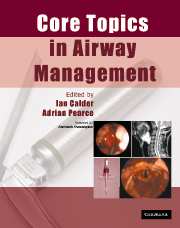Book contents
- Frontmatter
- Contents
- List of contributors
- Preface
- Acknowledgements
- List of abbreviations
- 1 Anatomy
- 2 Physiology of apnoea and hypoxia
- 3 Physics and physiology
- 4 Cleaning and disinfection of airway equipment
- 5 General principles
- 6 Maintenance of the airway during anaesthesia: supra-glottic devices
- 7 Tracheal tubes
- 8 Tracheal intubation of the adult patient
- 9 Confirmation of tracheal intubation
- 10 Extubation
- 11 Light-guided intubation: the trachlight
- 12 Fibreoptic intubation
- 13 Retrograde intubation
- 14 Endobronchial and double-lumen tubes, bronchial blockers
- 15 ‘Difficult airways’: causation and prediction
- 16 The paediatric airway
- 17 Obstructive sleep apnoea and anaesthesia
- 18 The airway in cervical trauma
- 19 The airway in cervical spine disease and surgery
- 20 The aspiration problem
- 21 The lost airway
- 22 Trauma to the airway
- 23 Airway mortality associated with anaesthesia and medico-legal aspects
- 24 ENT and maxillofacial surgery
- 25 Airway management in the ICU
- 26 The airway in obstetrics
- Index
23 - Airway mortality associated with anaesthesia and medico-legal aspects
Published online by Cambridge University Press: 15 December 2009
- Frontmatter
- Contents
- List of contributors
- Preface
- Acknowledgements
- List of abbreviations
- 1 Anatomy
- 2 Physiology of apnoea and hypoxia
- 3 Physics and physiology
- 4 Cleaning and disinfection of airway equipment
- 5 General principles
- 6 Maintenance of the airway during anaesthesia: supra-glottic devices
- 7 Tracheal tubes
- 8 Tracheal intubation of the adult patient
- 9 Confirmation of tracheal intubation
- 10 Extubation
- 11 Light-guided intubation: the trachlight
- 12 Fibreoptic intubation
- 13 Retrograde intubation
- 14 Endobronchial and double-lumen tubes, bronchial blockers
- 15 ‘Difficult airways’: causation and prediction
- 16 The paediatric airway
- 17 Obstructive sleep apnoea and anaesthesia
- 18 The airway in cervical trauma
- 19 The airway in cervical spine disease and surgery
- 20 The aspiration problem
- 21 The lost airway
- 22 Trauma to the airway
- 23 Airway mortality associated with anaesthesia and medico-legal aspects
- 24 ENT and maxillofacial surgery
- 25 Airway management in the ICU
- 26 The airway in obstetrics
- Index
Summary
Mortality due to anaesthesia
The UK is probably comparable to other developed countries where the mortality has been found to be approximately 1:10,000. UK anaesthetists will administer approximately 18,000–30,000 anaesthetics in their careers, so the chances of being involved in a tragedy are not negligible.
Causes of anaesthetic mortality
Mistakes or complications associated with drug administration cause the majority of deaths (approximately 40%). Deaths due to airway management have declined and in the last reported study from the USA, problems with airway management caused the same number of fatalities as central venous line insertion (20%).
Causes of airway mortality
The causes continue to be loss of airway during attempts at intubation, perforation of the pharynx, oesophagus or trachea, and oesophageal intubation. Rarer causes are aspiration of stomach contents, laryngospasm and bronchospasm.
Loss of airway at intubation
The mechanism is unclear but the scenario is well recognized –a patient, who was initially possible to ventilate with a mask, becomes impossible to ventilate after repeated attempts to intubate. Possible causes are swelling of tissues due to trauma, laryngospasm, operator fatigue and panic. The message is clear – do not make repeated fruitless attempts to intubate. Aim to make one ‘optimal best attempt’ with all factors properly arranged.
Perforation of pharynx/oesophagus or trachea
The cause of death is usually sepsis following the development of mediastinitis or cervical abscess. The mortality rate from mediastinitis is about 20%. Acute airway obstruction or respiratory failure can result from surgical oedema or pneumothorax. Only half of the perforations are recognized (pneumothorax or subcutaneous air) at the time. Perforation can occur during easy intubation, but is strongly associated with difficult intubation.
- Type
- Chapter
- Information
- Core Topics in Airway Management , pp. 173 - 176Publisher: Cambridge University PressPrint publication year: 2005



